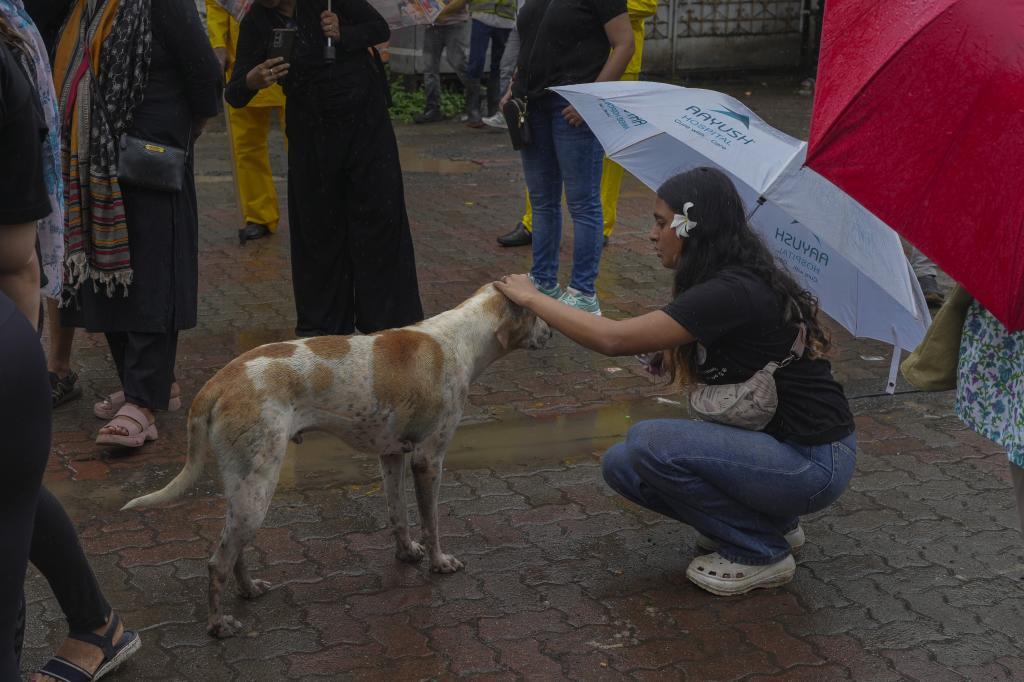Among the piles of waste and contaminated drains in the neighborhoods of New Delhi, stray dogs roam as just another part of the chaotic landscape of the capital of India. Most of them have dull fur, almost always the same grayish ochre color as the cracked asphalt and unpainted facades. Some are barely skin and bones, with scars on their faces and bitten ears, wandering in small packs among the dusty markets, rickshaws, and carts pulled by cows.
Some estimates suggest that around a million stray dogs may roam the streets of Delhi. The vast majority are harmless, and it is common to see children playing with these dogs. However, the issue of rabies has long been a concern for authorities: a bite, even a scratch, can be deadly.
For years, both local officials and many animal welfare organizations have launched vaccination and sterilization programs, but the massive presence of dogs on the streets has not ceased. Rabies cases, mostly caused by bites from these animals, have continued to increase.
On August 11th, the Supreme Court of India ordered the Delhi authorities to start removing all stray dogs from the streets, have them sterilized, and relocate them to shelters permanently. This decision was applauded by many residents, who see it as a necessary measure for public health crisis, while animal welfare organizations criticized the judicial ruling.
"The situation is extremely grim," stated the Court in a ruling that requires civic organizations in the capital to start a campaign to capture, initially, 5,000 stray dogs from high-risk areas and take them to shelters within eight weeks.
The judges also instructed the Delhi Government to set up a hotline for residents to report dog bite cases. According to hospital records, in this megacity with nearly 27 million inhabitants, there are around 2,000 dog bite incidents reported each day.
"Any person or organization that obstructs the authorities from removing dogs from the streets will face severe legal consequences," warned the Court in another statement regarding protests from animal welfare activists. Several activists were detained while protesting against the measure in front of the Court. "Can all these animal rights activists cure those who have been victims of rabies?" ironically questioned the judicial authorities.
India accounts for about a third of the world's rabies deaths. According to government figures, around 5,700 people die each year due to rabies. However, reports from the World Health Organization (WHO) estimate the actual number of deaths to be over 20,000.
Experts emphasize that in some areas of Delhi, this virus, which is transmitted from animals to humans, circulates endemically, and vaccines after bites are often not readily available to the public. Between January and June of this year, as shown by municipal data, the political center of the world's most populous country reported 35,198 animal bite incidents and 49 cases of rabies.
"Children should feel safe while riding bicycles and playing. The elderly should feel safe while walking," stated the Chief Justice of the Supreme Court, J. B. Pardiwala.
"The residents of Delhi are fed up with stray dogs. We have been discussing the issue, and the guidelines from the Supreme Court are important. We want to provide relief to the people. The problem has reached gigantic proportions," declared Delhi's Chief Minister, Rekha Gupta, in a press conference, assuring that her Government will soon announce how they will implement the court's order in a planned manner.
Animal welfare groups have also been organizing their campaigns on social media to criticize the measure. "Relocating dogs simply shifts the problem elsewhere. Long-term strategies, such as expanding animal birth control programs, are the scientifically proven solution," stated Alokparna Sengupta, director of the organization Humane World for Animals India.
"Communities consider neighborhood dogs as part of the family, and displacing and incarcerating dogs is unscientific and has never worked," protested veterinarian Mini Aravindan, India representative of the international animal welfare organization PETA. This group estimates that there are 100,000 stray dogs in Delhi, half of which are sterilized. A much lower estimate than the million mentioned by authorities.
"The forced removal of community dogs from the streets of Delhi will cause outrage among the communities that care for them every day, in addition to the chaos and suffering that all of this will cause on a large scale for the dogs," Aravindan continued. "If the Delhi Government had implemented an effective sterilization program, there would be hardly any dogs on the streets today. It is not too late to start, instead of wasting resources on ineffective and inhumane campaigns. Building enough shelters for all the dogs they intend to remove from the streets is unfeasible."
